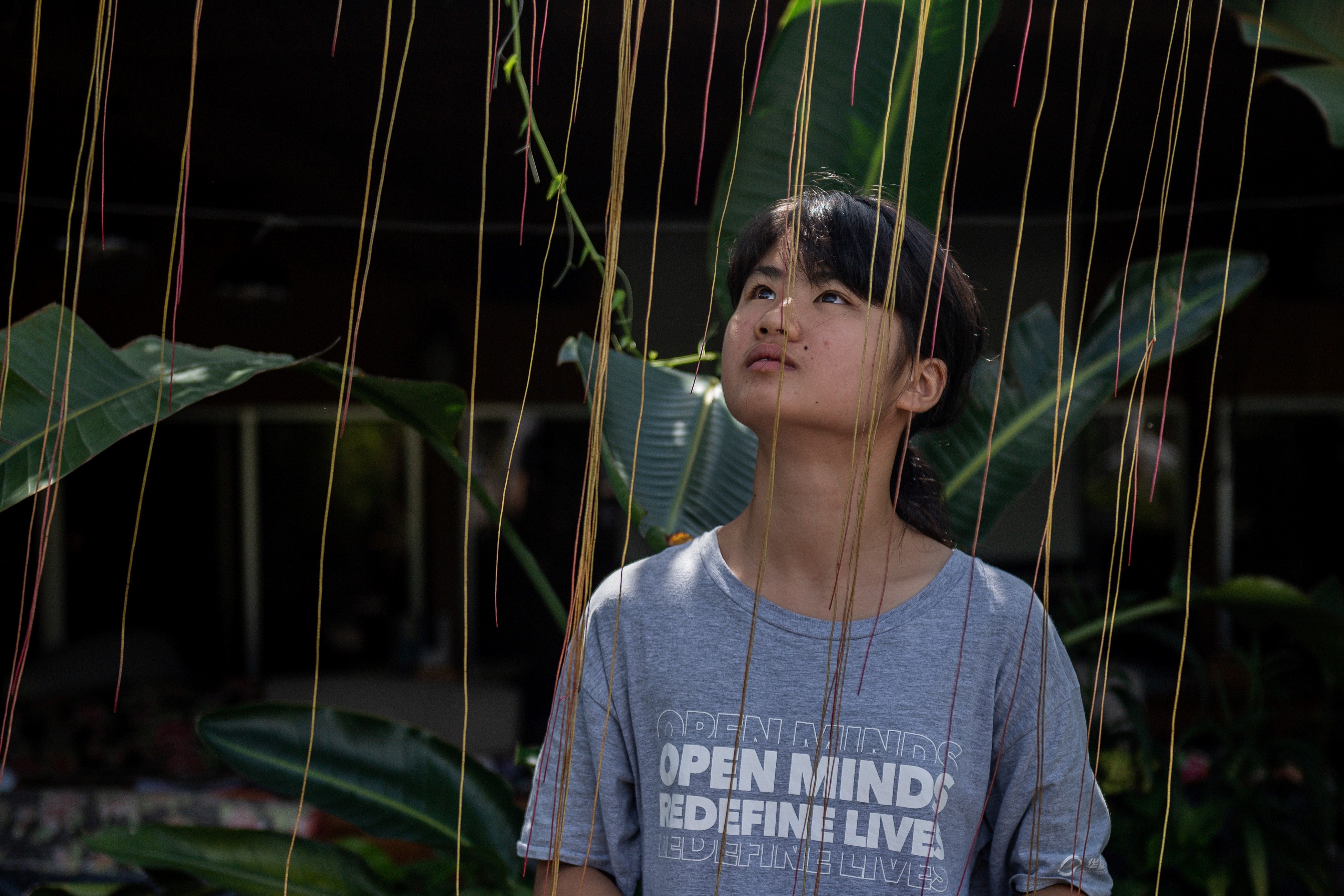China’s ‘Greta Thunberg’ fights lonely climate crusade: ‘Nature was injected into my blood and bone’
Any sort of activism in China amounts to a challenge to the Communist Party and Ou Hongyi is often harassed by the police and school officials

Your support helps us to tell the story
From reproductive rights to climate change to Big Tech, The Independent is on the ground when the story is developing. Whether it's investigating the financials of Elon Musk's pro-Trump PAC or producing our latest documentary, 'The A Word', which shines a light on the American women fighting for reproductive rights, we know how important it is to parse out the facts from the messaging.
At such a critical moment in US history, we need reporters on the ground. Your donation allows us to keep sending journalists to speak to both sides of the story.
The Independent is trusted by Americans across the entire political spectrum. And unlike many other quality news outlets, we choose not to lock Americans out of our reporting and analysis with paywalls. We believe quality journalism should be available to everyone, paid for by those who can afford it.
Your support makes all the difference.Ou Hongyi stopped going to school after watching Al Gore in “An Inconvenient Truth,” the documentary on the looming climate catastrophe, on her 16th birthday.
Her parents, both university lecturers, didn’t approve, but she was determined to try to make a difference — all the more challenging in China, where people trying to make a difference often evoke suspicion. Or worse.
In the two years since, she has waged a lonely, often frustrating campaign to raise awareness of the perils of a warming planet. She has joined international “climate strikes,” planted trees in her hometown in southern China, Guilin, and mounted a flurry of one-woman protests.
She has been called the Greta Thunberg of China, a nod to the Swedish activist who is only a few weeks younger. Ms Thunberg, though, has been feted for her activism. She speaks at Davos and the United Nations. Time magazine named her its person of the year in 2019.
In China, where any kind of activism amounts to a challenge to the ruling Communist Party, Ou has been ignored, ridiculed and ostracised as well as harassed by school officials and the police.
When she joined the Global Climate Strike on 25 September in Shanghai, an international event that attracted thousands of protesters at more than 3,500 locations, she was detained and questioned for several hours by the police. The officers scolded her.
“They thought what we were doing was meaningless,” she said.
China has had a poor environmental record, prioritizing its breakneck economic transformation over the past four decades. Now there are signs it has begun to consider the consequences of unchecked development like choking pollution, contaminated waterways and unusually heavy flooding that was attributed to climate change. The country’s leader, Xi Jinping, recently committed to making the sort of bold steps that activists like Ou have been calling for. He pledged that China’s emissions would peak by 2030 and that the country would reach “carbon neutrality” — the point where emissions are balanced with carbon offsets or removal — by 2060.
Xi’s promises have been welcomed by many but also greeted with wary skepticism, since meeting those goals will require significant changes to economic policy. Ou, who does not consider herself a critic of the government, demurred when asked about the goals.
“It is for scientists to assess how strong it is,” she said.
She then cited a recent report by three prominent climate researchers warning that China needed to meet those targets much sooner — peak emissions by 2025 and carbon neutrality by 2050 — if the world hoped to avoid catastrophic damage from global warming.
“Everyone should realise that the climate crisis is already the biggest existential crisis facing mankind,” she said.
People needed to read about the crisis, to understand it and talk to their friends and family about it.
“When they really read and understand it, they will know what they should do,” Ou said.
Ou, who turns 18 on 11 December, was born in Guilin and grew up on a college campus in a city renowned for its natural beauty. In one of several telephone interviews, she described hikes in the parks and mountains that surround the city. Nature was, she felt, “injected into my blood and bone.”
She liked school. She played soccer, although few other girls did. As a hobby, she drew and painted watercolors and later comics. Now she feels hobbies are indulgences.
“In the face of such a big problem at this moment, at every moment, when life is being maimed and tortured, what excuses do we have to entertain for our own desires?” she said.
Her ecological awakening, she said, began with a dream she had in January 2018. In it, she went to a restaurant where customers were presented with a bucket of fish and a knife. Each patron had to catch and kill a fish or not eat. When she was about to kill hers, “the fish turned to look at me,” she said.
“I still remember the extremely fearful look in its eyes,” she said. “I haven’t eaten any meat since then.”
Soon after, she read an article in a National Geographic magazine borrowed from the library. It detailed the devastating effects that the excessive use of plastics was having on marine life. Her first direct action was a failed effort to persuade her school cafeteria’s director to stop using plastic utensils.
“He thought that plastic disposable tableware was very hygienic,” she said. “I think his reason was that the cost would increase.”
At first, watching Mr Gore in “An Inconvenient Truth” convinced her that she should attend Harvard as he did. She decided instead to postpone the idea of college altogether and has devoted herself to independently studying the science of climate change.
When she heard of Ms Thunberg’s Fridays for Future movement in 2019, she was chagrined to learn there were none of the same sort of protests in China to draw attention to the issue of climate change. In May of that year, she held China’s first, standing alone with a picket in front of the Guilin municipal government building for six days.
On the sixth, the police took her in for questioning, calling in her parents and asking them to make her stop.
“Not everyone’s feedback is positive,” she said.
Still, the map of strikes around the world on Fridays for Future’s website now has a dot for Guilin. And a handful of new ones have spread to cities like Nanjing and Shanghai, perhaps inspired by her example.
Ou brushes off comparisons to her more famous climate counterpart.
“I feel that Greta’s knowledge of the climate crisis and her deep understanding and care for the world is something that I do not have yet,” she said.
Ou said her activism has strained her relationship with her parents, who still hope to see her attend college. Yet they became vegetarians, too, and still provide material and moral support. She spent much of the past two years trying — unsuccessfully — to build alliances with other activists in China.
China has environmental organisations, though they, like all nongovernmental groups, are under strict scrutiny from authorities and generally shy away from direct protest or criticism. When she tried to volunteer at the annual summit of the China Youth Climate Action Network in Shenzhen last year, organizers turned her away.
Hu Jingwei, an officer with the network, expressed admiration for Ou’s devotion, calling her “quite active and quite courageous.” She also said she was not sure that Ou “meets the qualification standards” to join the organisation but declined to explain why.
The New York Times



Join our commenting forum
Join thought-provoking conversations, follow other Independent readers and see their replies
Comments